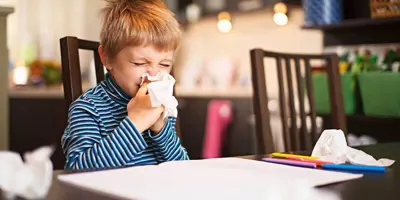30 people found this helpful

What to do with a nosebleed? If you’re dealing with a streaming nose, stay calm: our tips for how to stop a nosebleed are here to help you get it under control sooner, avoid mess and carry on with your day.
It’s always good to know what helps nosebleeds: once you’ve got these tips down, you’ll be able to put them into action whenever another one comes along – and pass your wisdom on stopping nosebleeds fast to others when they need it.
Important: If in doubt, always seek medical advice. For guidance on when to get emergency medical assistance, see the end of this article.
1. Stop a nosebleed by leaning forward
The first step if you’re not sure what to do with a nosebleed is to sit upright and lean forward, not back. Staying upright and forward reduces pressure in the blood vessels in your nose, which helps slow the flow. In addition to this helping to stop a nosebleed, it’ll help to stop you swallowing blood too.[1]
2. Stop nosebleeds with a pinch
Another trick for how to stop a nosebleed quickly is with a pinch. Whether you’re dealing with a minor trickle or a heavy nosebleed, a good pinch of the nose can do wonders in stemming the flow. In the forward sitting posture, pinch the soft part of your nose, just below the bridge, closing off both nostrils. This should stop the blood from coming out of your nose, but if you still see some, simply readjust your grip.[2]
Keep breathing through your mouth and hold the pinch for five minutes. After the first attempt let go of your nose, wipe away any blood with a facial tissue, and check to see if it’s stopped.
3. Pinch and repeat
The above two steps are tried and tested ways of stopping nosebleeds fast, but what if they don’t work? If you’re concerned about what to do if your nose is bleeding even after trying these steps, there’s no need to panic. Just repeat the process, gently and calmly, until the flow stops.
4. How to stop a nosebleed with ice
You can also try stopping strong nosebleeds by holding an ice pack or frozen vegetables over your nose. This will constrict the blood vessels and help slow down the bleeding. Repeat for up to 15 minutes and check again.
When to seek medical advice
If the bleeding continues for more than 20 minutes, you should head to the emergency department. Medical experts are much better placed at this point to determine what helps nosebleeds that aren’t stopping. In addition to seeking emergency medical advice if your nose bleeds for more than 20 minutes, you should also do so if:
- You’ve lost a significant amount of blood.
- A serious injury set off the bleed.
- You’re struggling for breath.
- You’re swallowing a lot of blood and it’s making you vomit.
In addition to emergency treatment, you should seek medical advice if any of the following apply:
- A child under two years old is bleeding.
- You’re having regular nosebleeds.
- You’re on blood thinning medication.
- You’re showing signs of anaemia – looking pale, shortness of breath or palpitations.[3]
Your doctor will be the best point of call for you to find out what's causing regular nosebleeds, and how to deal with them. Check out our everyday tips, too, for the possible causes of nosebleeds and how to cope with them.
Now that you know what to do if your nose is bleeding, you can take action. Keeping calm is key when figuring out how to stop a nosebleed quickly. Follow this step-by-step guide and you should be back on the go again in no time.
Related articles
Runny nose remedies: 6 ways to stop a runny nose
Looking for a runny nose remedy you can make at home? For five family-friendly ways to stop a runny nose, click here.

Struggling with your sinuses? Try these home remedies for sinusitis
What helps sinusitis? Find out how to treat sinusitis at home and some chronic sinusitis treatments and home remedies, here.

How to stop a runny nose: why do we get runny noses and 5 ways to stop them for good
Find out how to stop a runny nose naturally. Discover our top tips, and natural and herbal remedies for a runny nose to stem the flow more quickly, here.

How to get rid of cold sores: 4 natural home remedies
Looking for the best cold sores treatments? Find out their causes and how to get rid of these irritating blisters with Cushelle home remedies for cold sores here.

5 oily skin tips: how to cope with oily skin
Learn how to prevent oily skin with your skincare routine, diet and home remedies for oily skin, plus the best make-up for shiny skin. Click here for more

5 beauty hacks that will streamline your on-the-go routine
A clean and organised makeup bag means a smooth and hygienic beauty routine. Read on for the makeup beauty hacks and makeup tips and tricks that’ll streamline on-the-go pampering.



